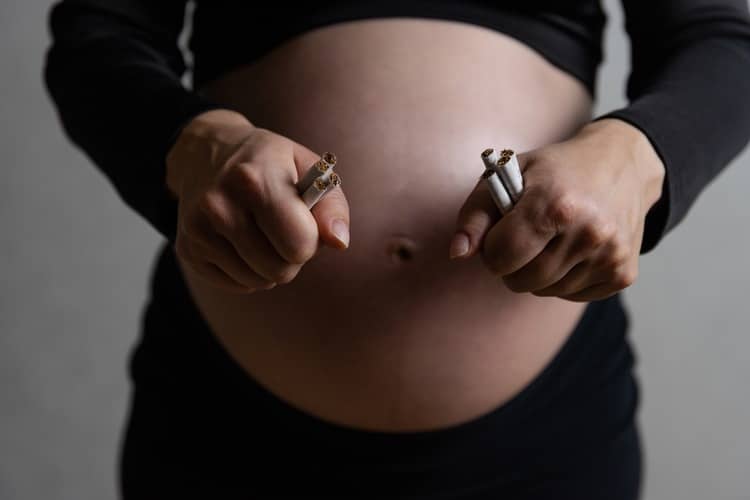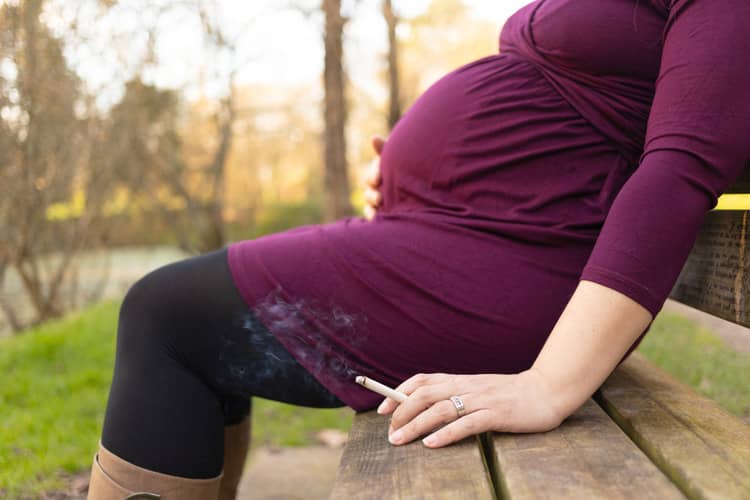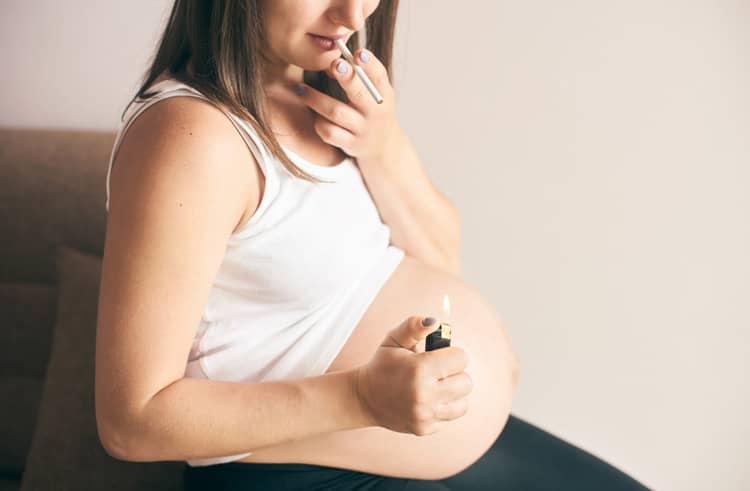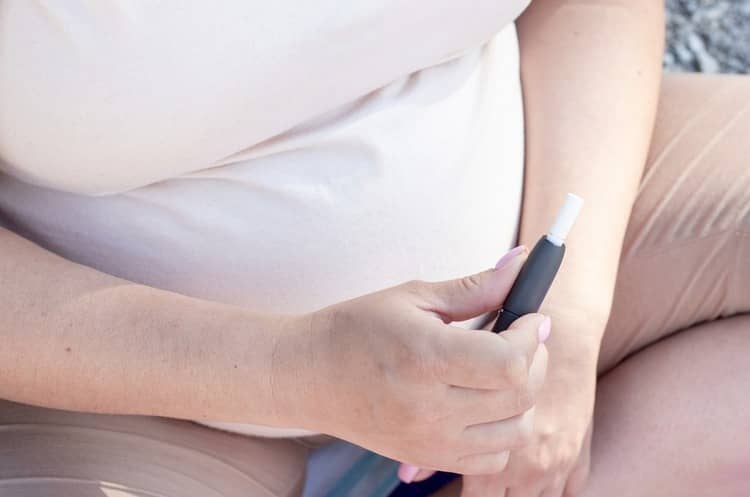
Smoking during pregnancy and its consequences. Electronic cigarettes and chewing tobacco are not the solution
Weakest tobacco cigarettes, light cigarettes, electronic cigarette or chewing tobacco during pregnancy. None of the listed options is suitable for pregnant women. However difficult a problem smoking addiction may be, nicotine during pregnancy has been proven to have a negative effect on the health of the fetus. There is no conflicting information, smoking during pregnancy has an exact negative effect on the vitality of the child, on which the entire medical and professional public agrees. By smoking during pregnancy, you are deliberately harming the baby, and even smoking an electronic cigarette during pregnancy is not a solution. Increased risk of miscarriage or premature birth, sudden infant death syndrome and many other consequences. What causes smoking during pregnancy? How to stop smoking during pregnancy?
- Smoking during pregnancy is harmful to the child and the mother
- Effects of smoking during pregnancy on the child
- Effects of smoking during pregnancy on the mother
- Smoking during pregnancy is a global problem
- Passive smoking is equally harmful
- Nicotine-free cigarettes, IQOS or chewing tobacco?
- How to stop smoking during pregnancy?
- Smoking during pregnancy - experience
- The most frequent questions - FAQ
- Comments
Some women believe that it is enough to limit the number of cigarettes smoked during pregnancy. The fact is that even according to the International Health Organization (WHO), there is no safe number of cigarettes smoked during pregnancy. On the contrary, even one cigarette can result in negative effects on the baby in the womb and the occurrence of congenital developmental defects. Naturally, a smaller number of cigarettes a day is safer than a whole pack. However, this is no excuse for smoking during pregnancy. Summa summarum, however, the effects of nicotine and harmful substances contained in smoke are extremely dangerous. The sooner you stop smoking during pregnancy, the better for you and your baby. During this period, expectant mothers have an ideal opportunity to quit smoking during pregnancy and maybe never go back to cigarettes.
Smoking during pregnancy is harmful to the child and the mother
Cigarette smoke contains at least 4,000 different harmful substances, many of which are carcinogenic, contain heavy metals or other toxins. Even one regular cigarette a day during pregnancy results in a more complicated supply of oxygen to the fetus. Among other things, it is precisely components such as nicotine and carbon monoxide that enormously reduce the ability of oxygen and nutrients to flow through the vessels of the placenta to the fetus.
During pregnancy, the child and mother are connected by the placenta, through which the child's body is nourished and supplied with oxygen and blood. Smoking during pregnancy can cause the placenta to malfunction. It is through the placenta that various toxic substances can reach not only the lungs, but also other organs. Smoking and the effects of nicotine also cause narrowing of blood vessels in a pregnant woman's body, including the umbilical cord, which is caused by the fact that red blood cells do not bind oxygen, but carbon monoxide. The consequence is that fewer oxygen molecules reach the fetus and hypoxia occurs. The fruit is essentially "suffocated" by carbon monoxide. It is proven that inhaling such harmful substances increases the load on the heart of the fetus (the heart beats faster).
Many researches and studies dealt with the impact of smoking on pregnancy, the health of the woman and the fetus, and in several cases there were demonstrable connections. Such cases also include a connection with a lower birth weight of the child in women who smoked during pregnancy. It has also been confirmed that a higher frequency – more cigarettes smoked during pregnancy – directly proportionally increases the rate of occurrence of other risks. A direct connection also appeared in cases of increased incidence of respiratory tract infections and occurrence of developmental defects - especially heart defects. Smoking also has a negative impact on the later development of the child after birth.
Passive smoking also has negative effects, that is, if a pregnant woman is in an environment with cigarette smoke. A woman who does not smoke, but is exposed to passive smoking during pregnancy, has a higher risk of complications related to the development of the fetus, reduction of the baby's lungs, and the occurrence of sudden infant death syndrome and many other health abnormalities is also possible.

Effects of smoking during pregnancy on the child
When smoking during pregnancy, the negative effects on the baby are already manifested during its development in the womb. A typical sign of newborns whose mothers were unable to stop smoking is low birth weight. This is related to the weaker growth ability of the fetus and poor weight gain. Other problems with delayed development of the baby and other health complications are also related to this.
A baby's development can be marked not only by slowed growth, but also by congenital developmental disorders - cleft lip, cleft palate, finger anomalies, but also the development of cardiovascular diseases (20 to 70% higher chance), problems with concentration, learning, ADHD, mental problems and weaker cognitive abilities. According to some research (Frontiers), MRI scans of children whose mothers smoked during pregnancy showed a smaller surface area of the gray cerebral cortex. Changes to the brain have been shown to be long-lasting. Nicotine, which contains mutagenic and toxic substances, is considered to be the cause of this condition. The absence of an optimal amount of oxygen also plays a role.
A high risk factor is the risk of fetal death in the womb. This is usually caused by insufficient nutrition, which is caused by the narrowing of blood vessels in the woman's body as a result of smoking. The risk of SIDS – sudden infant death syndrome – is also increasing. According to the WHO, this factor is even more risky if a woman continues to smoke even after giving birth. Respiratory tract infections also appear more frequently (weaker lungs due to delayed development), chronic diseases or metabolic disorders, e.g. higher risk of obesity and overweight. Smoking during pregnancy can cause the child to develop diabetes later. Here is a list of the most common consequences for the baby associated with smoking during pregnancy:
- lower birth weight and poor weight gain,
- the risk of fetal death in the womb,
- incidence of SIDS – Sudden Infant Death Syndrome,
- delayed development and changes in the child's brain,
- congenital developmental disorders and abnormalities,
- higher risk of respiratory tract infections and respiratory diseases (breathing difficulties) – pneumonia, bronchitis, asthma, chronic cough, reduced lung capacity...,
- occurrence of cardiovascular diseases (heart defects) and problems with high blood pressure,
- problems with hyperactivity, maintaining attention and weaker development of cognitive abilities,
- higher risk of obesity and overweight in children.

Effects of smoking during pregnancy on the mother
The very consequences for the mother are in many cases fatal for the child as well, or they have an effect on the course of pregnancy and thus on the vitality of the fetus. Nicotine as such is primarily harmful to the unborn child, but mutagenic substances primarily affect the mother's organism and only then reach the fetus. Long-term practice has shown that smoking increases the risk of ectopic pregnancy, which cannot be carried to term and is also a life-threatening condition for the woman herself (risk of internal bleeding in the abdominal cavity).
Very often, nicotine and toxic substances contained in smoke cause problems with the functionality of the placenta. In addition to problems with the narrowing of blood vessels (weaker oxygenation and blood circulation), the placenta may detach from the uterus, which seriously endangers the fetus. In women, placental disorders can cause massive bleeding. The aforementioned low birth weight of the fetus is related to its insufficient development, but smoking during pregnancy increases the risk of premature birth. Problems with the subsequent development of the child are related to this - behavior, learning, mental problems, but also health problems with sight or hearing. Last but not least, by smoking, a woman reduces her fertility (this also applies to men) and shortens her transition - the period of menopause. According to gynecologists, it is important to warn women about the negative effects of smoking even before pregnancy.
- Increasing risk of spontaneous abortion,
- high risk of premature birth,
- premature outflow of amniotic fluid,
- problems with the functionality of the placenta (abruption - detachment of the placenta from the uterus),
- higher chance of ectopic pregnancy,
- acceleration of the onset of menopause.
Smoking during pregnancy is a global problem
The statistics are very negative in this regard. More than 13% of pregnant women in Slovakia smoke during the entire pregnancy. On the plus side, 20-30% of women quit smoking during pregnancy, but approximately 70% of pregnant women return to smoking during or immediately after pregnancy. However, the sad statistics do not only apply to Slovakia.
In Europe and America, roughly one tenth of women smoke during pregnancy. For example, a 2018 study published in the prestigious scientific journal The Lancet lists the countries where women smoke the most during pregnancy. Among the analyzed countries, Ireland was the leader, where up to 38.4% of women reportedly smoke during pregnancy. It was followed by Uruguay – 29.7%, Bulgaria – 29.4%, Spain – 26% and, surprisingly, Denmark – 25.2%. An unpleasant finding is also the fact that up to 72.5% of pregnant women who smoke smoke daily, 27.5% smoke occasionally. As many as 13.5% of pregnant women said that in their case it was really heavy smoking during pregnancy.

Passive smoking is equally harmful
According to the CDC, smoking kills more than 7 million people in the world every year, and this number also includes children and adolescents. Even a pregnant woman who does not smoke, but in the environment in which she stays, is exposed to risks related to passive smoking during pregnancy. There is also a risk of congenital anomalies of the fetus, low birth weight of the child, the development of various respiratory diseases, the risk of fetal death in the womb (stillbirth). There is also a risk of SIDS.
Passive smoking also affects already born children. Children who live in an environment where smoking is up to 70% more likely to smoke their first cigarette by the age of 15. In small children under the age of 5, there is a risk of acute asthma, respiratory diseases, respiratory tract infections, otitis media, and the risk of premature death is also increased.
Nicotine-free cigarettes, IQOS or chewing tobacco?
Many women who smoke modern electronic cigarettes believe that nicotine and toxic substances in this form represent a lesser evil and are a great alternative to "stinky" tobacco cigarettes. However, the fact is that although in some cases the health risks are lower compared to classic cigarettes, it does not change the presence and concentration of nicotine. The positive is the absence of carbon monoxide. Using an experimental method during research on mice, it was found that long-term use and inhalation of vapors from e-cigarettes caused extensive changes in the lungs of mice. The effectiveness of quitting traditional cigarettes has been scientifically proven, but again it is just another need to take "nicotine", but in a different form.
The weakest cigarettes during pregnancy (light), vaporizers, electronic cigarettes, nicotine-free cigarettes or chewing tobacco during pregnancy are not the lesser evil. In each of the cases, there are negative effects on oxygenating the blood and supplying the heart with an optimal amount of blood. It is still true that smoking during pregnancy represents one of the greatest risks for the child and the pregnant woman.

How to stop smoking during pregnancy?
The key is to realize that quitting smoking in this case is not only for yourself, but also for the health of your child. Having a healthy baby is the dream of every future mother. Unfortunately, when it comes to smoking, there is no universal guide that will guarantee that quitting this addiction will go perfectly in your case. According to doctors, it is considered ideal to quit smoking a year before the planned conception. And it concerns both partners.
If you have just found out that you are pregnant, but you have been smoking a regular dose of cigarettes until this day, the best option is to stop immediately. The body will no longer receive carbon monoxide and nicotine will begin to flush out of the body. After reading our article, you will know for sure what causes smoking during pregnancy. No IQOS, electronic cigarettes or nicotine-free cigarettes during pregnancy are suitable alternatives. According to the vast majority of doctors, smoking even one cigarette during pregnancy is extremely irresponsible. If you stop smoking right away, you will prolong your life, but mainly you will eliminate the risks related to pregnancy and the development of the fetus. However, anyone who has not been addicted to smoking can hardly imagine how difficult quitting can be. It is therefore advisable to consult with doctors and experts. We have some simple tips for you, with which you can try to stop smoking already before or during pregnancy.
- If you have a regular ritual that includes a cigarette, try replacing this ritual with something else. Replace the classic combination of coffee and a cigarette with tea and reading a newspaper.
- If you go to businesses where you can light up, try to move to areas where smoking is prohibited. You will avoid passive smoking and the provocative aroma of cigarettes.
- Try to motivate yourself. Calculate how much you spend on cigarettes per month. Save this amount, double it and buy something you want (except cigarettes).
- If you are getting into the abstinence phase, in which you need to reach for a cigarette, try some activity - exercise, brushing your teeth, chewing gum, sucking on a spicy or fruity candy. Distract your attention and, above all, do not store any tobacco products at home that would tempt you.
The most effective argument and guide to stop smoking during pregnancy should be the fact that you want to give birth to a healthy child.
Smoking during pregnancy - experience
In most cases, mothers' opinions agree, but there are also interesting exceptions. However, it is still true that most mothers are aware of the risks associated with smoking and radically reject smoking during pregnancy. Most often, they argue about the permanent consequences that smoking can leave on the fetus. Quite a lot of discussions are about women who have found out they are pregnant, but can't get rid of smoking cigarettes. Other mothers recommend stopping smoking and overcoming withdrawal symptoms precisely because every cigarette during pregnancy means a threat to the child's life. Even women who spoke of a lack of willpower decided to quit smoking overnight or within 2 weeks by reducing the number of cigarettes. However, there are also cases in which women report that smoking during pregnancy did not harm their children in any way.
The most frequent questions - FAQ
There is no debate within the scientific and medical community about whether smoking is harmful during pregnancy. Discussions are only about the extent to which smoking during pregnancy can harm the fetus or the mother's health. What is your opinion on smoking during pregnancy? Was heavy smoking a problem for you during pregnancy? What are your experiences with quitting smoking? How to stop smoking during pregnancy and what about electronic cigarettes? We will be happy if you join the discussion under the article. We will also be happy to answer other questions.
What causes smoking during pregnancy?
How to stop smoking during pregnancy?
Is smoking an electronic cigarette during pregnancy suitable?
Pridať komentár





